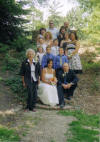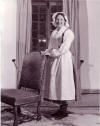


GENEALOGY
MATERNAL SIDE
SHALAGIN LINEAGE
MAXIMOVNA VASILIEVICH SHALAGIN
-
Maxim Vasilievich Shalagin ([?]-c.1935-1937)
-
Children:
-
Alexandra (Sonia) Maximovna Shalagin (November 6, 1902-April 16, 1984), b. Krasno-Usolskii, Russia
-
Married: July 30, 1921, Alexandrovka, USSR Anthony (Anton, Antoni) (Tony) Chwedchuk (July 8, 1900-January 10, 1961), b. Stara Strelna, Belorussia, d. Toronto, Canada, buried Fonthill Cemetery, Welland, Ontario
-
-
Nikolai Shalagin ( -1956)
-
Pelagia (Polya) Shalagin ( -1979)
-
Natalia Shalagin
-
Married: Efimov Grigoriev
-
Children:
-
Zoya Grigoriev
-
Married: Nickolai Kislitsin ( -1966)
-
Children:
-
Alexander Nikolaevich (Shurik) Kislitsin (August 25, 1945-July 12, 1995)
-
Victor Nikolaevich (Veetya) Kislitsin (November 23, 1957-)
-
Nickolai Nikolaevich (Kolya) Kislitsin (June 7, 1959-)
-
Tatiana (Tanya) Nikolaevna Kislitsin
-
Married: Alexander (Sasha) Mistiukovna
-
Children:
-
Andrei Mistiukovna (c.1989 -)
-
-
-
Andrei Nikolaevich Kislitsin (1963-)
-
Married: [?]
-
Children:
-
Unknown female Kislitsin (c.1985-)
-
-
-
Valentina Nikolaevna (Valya) Kislitsin (August 25, 1951-)
-
Married: Vladimir Lisovskaya? [Valentina Nikolaevna (Valya) Kislitsin (August 25, 1951-)
-
Children:
-
Sergei Vladimirovich Lisovskaya? (September 12, 1973-)
-
-
Married: 1994 Andrei Grigorievich
-
-
-
-
Unknown male Grigoriev
-
Unknown male Grigoriev
-
-
-
SHALAGIN
DESCENDANTS
ANCESTRAL GENEALOGICAL NOTES
-
Maxim Vasilievich Shalagin (?-c.1935-1937), a baker by trade, born in the village of Krasnousolskii [KRASNO-USOLSKII], Russia just east of Sterlitamak and south of Ufa, southern Ural Mountains. On April 8, 1934, he was living in the Beloretsk Region, Beloretsk, 43 Oochitel (i.e. teacher) Street, Bashkir Republic. On November 29, 1935, A. Chwedchuk sent $5.00 to Serafima Felimonovna "Shalagina, Pojarnaia St No. 17, Beloretsk, Bashkir Republic, Russia. He was dead by 1937.
-
Maxim Vasilievich Shalagin (?-c.1935-1937) and Serafima Felimonovna Klement [Kleon] were the parents of Alexandra (Sonia) Maximovna Shalagin. Serafima Felimonovna Klement was an elegant looking, tall lady.
-
Catherine (Ekaterina) Chwedchuk (Fled in c. 1914 to the Ural Mountains near Ufa where she died in c. 1922 together with her two daughters when the family, that included Anton - but not Daniel who was in the USA since 1913 - left to return to Stara Strelna [Strelno, Poland].
-
Nikolai Shalagin ( -1956) died by choking.
-
Pelagia (Polya) Shalagin ( -1979) remained a spinster, and may have had some type of handicap.
-
Stara Strelna [Old Strelna]: Later, until 1918, Strelno in German when it was located in Prussia; Afterwards, 1918-1939, Strzelno in Polish when it was located in Poland], Volost of Yanovo, Drohichin Region, Belorussia [Strelna in Belarus: СТРЕЛЬНА] - Belarus pre 1918 and post 1945, sometimes known as White Russia]
-
Village Strzelna, district of Drohiczynsk
-
Stara Strelna [Stara Strzelna] village, Brest Oblat, Ivanov Region, Belorussia, was near Kobrin, about 120 km east of Brest, and 20 km east of Drogichin [Drahicyn].
-
Village of Alexandrovka, Volost of Nagat [Nagadat], Sterlitamak Region, Oblast of Ufa, USSR, about 2000 kilometers from Stara Strelna [Strelno, Poland].
----------------------
-
Re-Settlement In The Urals
When the war between Germany and Russia broke out on the eastern front in 1914, thousands of Belorussians, Russians and Ukrainians in the border areas packed up a few belongings and scrambled onto trains or horse-drawn wagons as quickly as possible and headed east to escape the blood bath. Grandmother Ekaterina Chwedchuk did likewise, and ended up in the Ural Mountains area near Ufa with her two daughters and 14 year old son Anton, who was later to become my father. Her husband Daniel was in the United States at that time, having emigrated there in 1913 to Springfield Mass., in the hope of bringing the rest of the family later to join him.
The family stayed near Ufa and Sterlitamak until after the war and the revolution everyone pitching in to survive those war-time years. With so many able-bodied men conscripted into the army, young Anton was able to find work in the local post office, where he became a telegraph operator. That was where he met mother, who also was employed there (note that it is still common practice in many countries in Europe for the post offices to provide telegraph and long distance telephone as well as postal services). They got married in the village of Alexandrovka near Sterlitamak on July 30, 1921, and made plans to move to the family farm which had by this time become part of Poland in accordance with post-revolution treaties.
Details about mother's family and life during her youth are rather skimpy, perhaps because I didn't pay close attention to her stories when I was young, and didn't think to question her and write things down when I was older. Her father, Maxim Vasilievich Shalagin, was a baker, supplying bread and pastries to the town of Sterlitamak from his private bake shop. After the revolution, most businesses became state property, and his bake shop was also absorbed into a state bakery, where he continued to work. Mother received her education there, equivalent to our grade 8. She learned to sew and took up sewing clothes for people for a living, and later got a job in the local post and telegraphy office where she met Anton.
The losses suffered by the Russian army in the war against Germany included 1.7 million dead, 4.95 million wounded and 9.5 million prisoners. Most of the fighting occurred within a few hundred kilometers of the eastern border. The revolution, however, involved people throughout the country, and likewise took a terrible toll in lives, shattered families and social disruption. In the early stages, before regular army units had been formed, what took place was essentially a type of guerrilla or partisan warfare, with men on horseback and on foot occupying a town or village here and there, perhaps to be forced out by stronger opponents some days or weeks later. Horses, cattle, poultry, grain and other food were confiscated or pillaged by both sides, prisoners were mistreated or shot, and anyone suspected of aiding the enemy might have his house burnt down. Families were often split in their allegiance, with fathers, sons and brothers joining opposite sides and fighting each other. Atrocities were committed indiscriminately, in the name of the revolution and freedom for workers and peasants on one side and of the Tsar and freedom from Bolshevism on the other. Mother recalled one incident when a soldier asked a peasant woman for some apples. When she replied that she had none left, he shot her on the spot, and laughed as she crumpled on the floor of her porch.
Mother's family home was also burnt down during one skirmish. She and her mother managed to salvage some belongings which were brought out to the street in a trunk, and they asked a villager if he would watch it while they went back into the burning building to try and retrieve some more. He agreed to stand by for a while, but when they came back out, the man and the trunk with everything in it were gone.
Toward the end of 1921, with fighting between the revolutionary and counterrevolutionary forces having come to a close, people started to muster their energies in an attempt to restore normal civilian life. Anton Chwedchuk and his family, however, had become homesick by this time; after all, it was over seven years since they had left home in the village of Stara Strelna near Kobrin in Belorussia. Certainly they must have made some friends in the area near Ufa, but they had no house of their own there, while back in Anton's home there was some land on which they could make a living, and perhaps a house and barn, if they had not been destroyed during the war.
It must have been a difficult thing for Alexandra, however, to leave her family, friends and home behind and take off with a new husband and his family on a trek of about 2000 kilometers ....
[Later: 1970 and 1976 visits by Alexandra (Sonia) Maximovna Shalagin (November 6, 1902-April 16, 1984)]
The job did wonders for mother's frame of mind. It gave her a feeling of being useful, a recognition of her abilities, some independence, and a pension from the hospital, as well as entitlement to the Canadian Pension Plan after she retired. Her savings, along with the rent from the farm, enabled her to send parcels of clothing every year to her widowed niece Zoya and her six children in the Soviet Union, as well as to take two trips there to visit her own two sisters in 1970 and 1976. Those two trips on the ship Pushkin across the Atlantic to Leningrad, and by air from there to Beloretsk near her home town in the Ural Mountains were the highlights of mother's life after she left the farm. They were real adventures, including a ride in the country in a motorcycle side car with her sister and brother in law, getting stuck on a muddy road and having to stay overnight at a farm house. On another occasion, she took a chance to go to the large industrial city of Magnitogorsk by bus with her sister, only to be confronted by the KGB police the next day for violating rules about visiting places without prior permission. Amazingly, there was not the slightest qualm or hesitation about making these trips by herself, although she hoped that I would come with her on another one after I retired. ....
SOURCES
Leonard Chwedchuk, FROM REVOLUTION TO DEPRESSION
(Memoires of an immigrant family from Eastern Europe arriving in
Canada in 1930), (Ottawa, January, 1999) [Microsoft Word Document © Leonard Chwedchuk]
